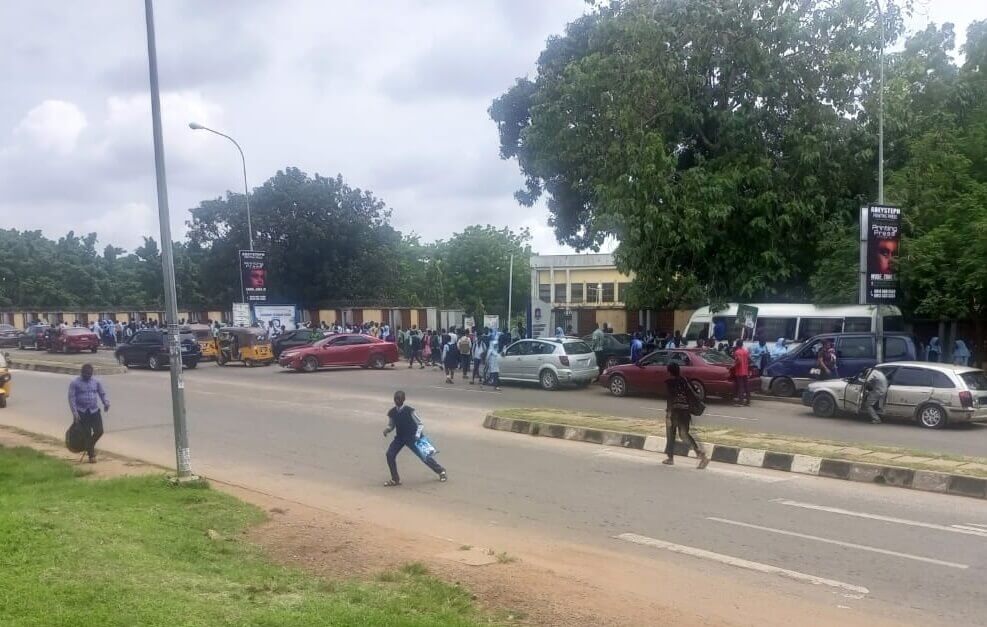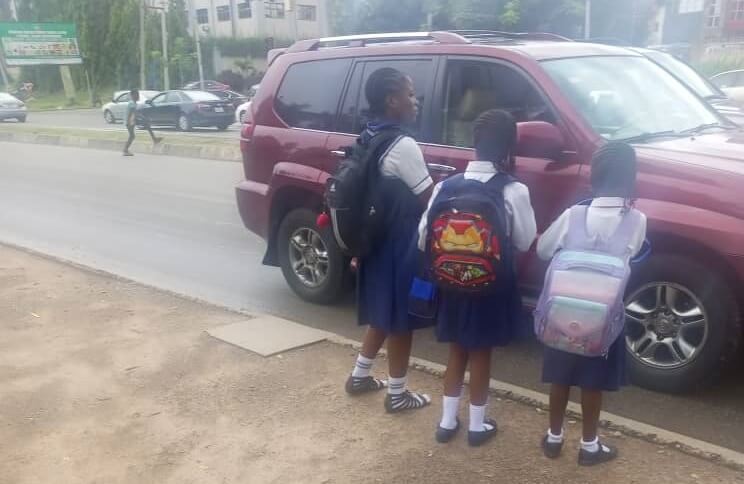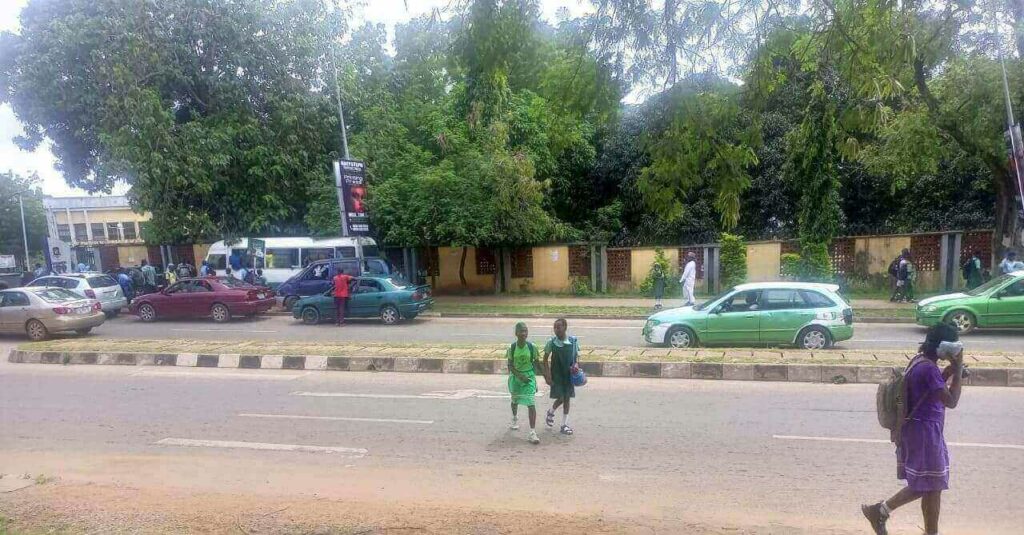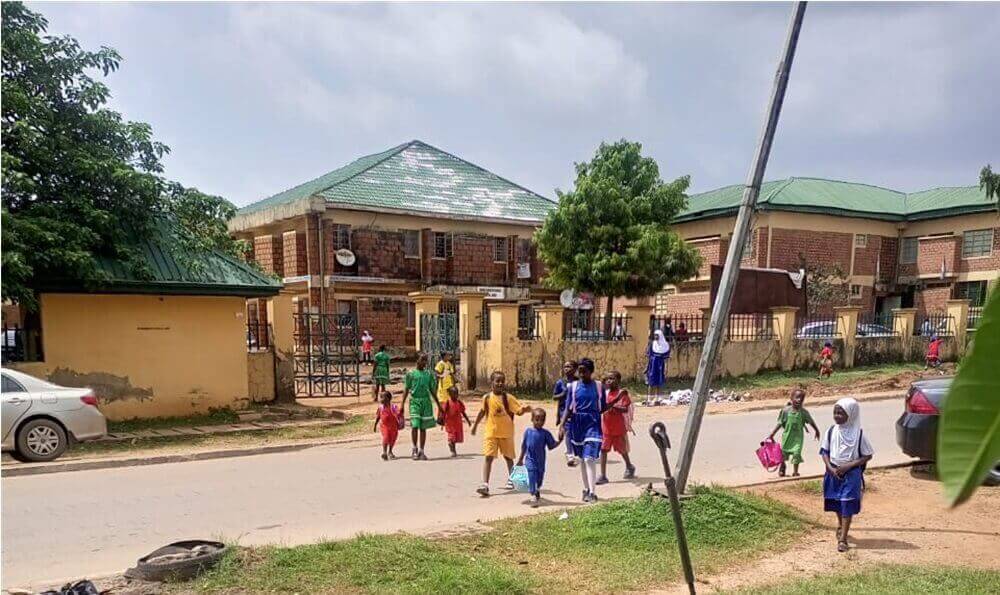INVESTIGATION: 9,000 Children Knocked Down In 2 Years As Public Schools Expose Students To Road Dangers
It was 2 p.m. on Thursday, September 14, and the closing bell had just rung for students of Government Secondary School Garki, Area 8, Abuja. Students of the junior secondary school trooped out and lined the Kalem Salem Road just outside the gate.
Some entered private vehicles belonging to their parents or hired for them, parked along the road, while some were seen boarding taxis. But dozens of other schoolchildren had to cross the busy road to the other side without anyone helping them. No Federal Road Safety Corps officials. No school security personnel. The students, some barely 11 years old, had to find their way home.
Advertisement
After waiting for two oncoming vehicles to pass, Vincent Kolawole rushed across the road to avoid a car trying to beat the traffic light. He crossed the road successfully but his 11-year-old brother could not make the dash. He was left on the other side of the road, waiting for the right opportunity to cross.
Kolawole waited anxiously by the side of the road for his brother to cross the ever-busy road, fear and apprehension in his eyes. He must have waited a while to ensure no vehicle was approaching from his left before launching across the road with his school bag strapped to his back. He crossed the first road, but as he made to cross the other road, a speeding taxi slammed the brakes, and the screeching sound forced other students and pedestrians to look in the boy’s direction. But he had already crossed over!

Kolawole and his brother come daily to the school from Piow, Jabi area of the city where they live with their parents—a distance of about 4 kilometres. He’s in senior secondary class two student while his brother is in the junior school. He told THE WHISTLER that what happened on the afternoon of September 14 was a regular occurrence because their parents could not afford to send a car to pick them up from school.
Advertisement
They however get N500 daily for their transportation to and from school, which hardly takes them back home. They will have to trek about 250 metres to Area One roundabout, crossing two busy road intersections, to board a commercial vehicle heading their way. “Every day it’s like that sir,” he said, adding “When we’re coming to school, we also trek some distance before boarding Keke or taxi.”
Public primary and secondary schools in Abuja have no transportation system for their pupils and students. Many schools have no single bus for students while those that have, have only one 16-seater.
Kolawole’s school has only one bus which is not for the transportation of students. It’s only used to transport students when they’re going to events in which the school is participating. School administrators and teachers in the Federal Capital Territory (FCT) required authorization from the school boards to speak to the press on any issue.
But many principals and teachers who spoke to THE WHISTLER on condition of anonymity lamented the situation, saying the government does not make any provision for transportation of students either to school or from school, stressing that there’s no provision for schools that even have one to maintain them.
A good example is the Government Secondary School, Tudun Wada, located in Zone 4. It’s one of the largest schools in the FCT, having junior, senior secondary and a primary school. Once the school rings the closing bell by 1.30 pm, the students whose parents could not come to pick them up would troop out of the school and spill themselves on the busy roads passing in front and behind the school.
Advertisement

When THE WHISTLER asked a senior teacher why the school had no transportation system for students, he giggled wryly before asking “Bus in a government school in Nigeria?” And while pointing at a rickety coastal bus, he added, “That’s the only bus the school has and it’s not in good condition. We only use it when there’s an important event involving our students.”
When THE WHISTLER asked how a ten or eleven-year-old pupil registered in the school could come and go back home safely after school, he said the students usually leave in groups to their various locations with the eldest leading the rest. “He will just find a group of students going to your area and follow them, that’s what we encourage our students to do when they close from school because there’s nothing else we can do,” he said, with a tone of regret.
The lack of a functional school transportation system exposes pupils and students to road dangers. According to data given to THE WHISTLER by the Federal Road Safety Corps, a total of 9,129 school children were involved in road accidents between 2021 and 2022, with the FCT, Kaduna, Bauchi and Jigawa States having the highest figures.
In 2021, 213 school children were involved in car or keke accidents in Abuja. Five of them died as a result of the accident while the rest nursed different degrees of injuries. In that same year, Kaduna recorded the highest number of victims with 457 children involved out of which 49 were killed. Bauchi came next with 391 kids out of which 32 lost their lives. Bayelsa had the lowest figure for the year with 2 killed out of 8 victims.
For 2022, Jigawa is highest with 354 victims out of which 27 died. It’s followed by Kaduna with 343 victims and 37 dead. FCT came next with a total of 313 victims of road accidents out of which 12 died. Imo State had the least with 13 victims and no death recorded.
Advertisement
Road dangers for children do not appear to be a priority for education authorities in the country as no school in the nation’s capital has any arrangement that makes the students safe while coming to or leaving school premises.
Government officials who spoke off-the-record to THE WHISTLER acknowledged the problem but blamed it on lack of funds. “We plan and work based on budgetary provisions and what is given to us,” said an official of the FCT Education Secretariat, while responding to findings by THE WHISTLER.

Patience Ossai, public relations officer of the FCT Universal Basic Education Board declined to comment on why schools have no transport system for students. She said only the chairman of the Board, Prof Abdullahi Mohammed, who was unavailable could speak on the issue.
However, a member of the board told THE WHISTLER that the admission policy into junior and secondary schools in Abuja prioritized proximity to the residence of applicants. “We always advise parents to choose schools that are closest to their areas of residence to avoid this kind of situation that exposes the children to traffic dangers,” he said, adding that it is the reason that schools were established in all parts of FCT.
LEA Primary School, Mambolo Street, Zone 6, Abuja, also has a secondary school arm. The school has no bus for students and the gate is thrown open at 1:30 p.m. when the closing bell rings. Parents drive in to pick up their children while some without cars walk in.
Other Children with no one to pick them up are left to cross the busy Mambolo Street road that leads to Abuja Metropolitan Management Office and go home. While going home in groups of two or three pupils, they still have to cross the roads on their own, and at the mercy of motorists who are sometimes reluctant to release their legs from the accelerator.
The Federal Capital Territory has 199 junior secondary schools and 502 primary schools.



